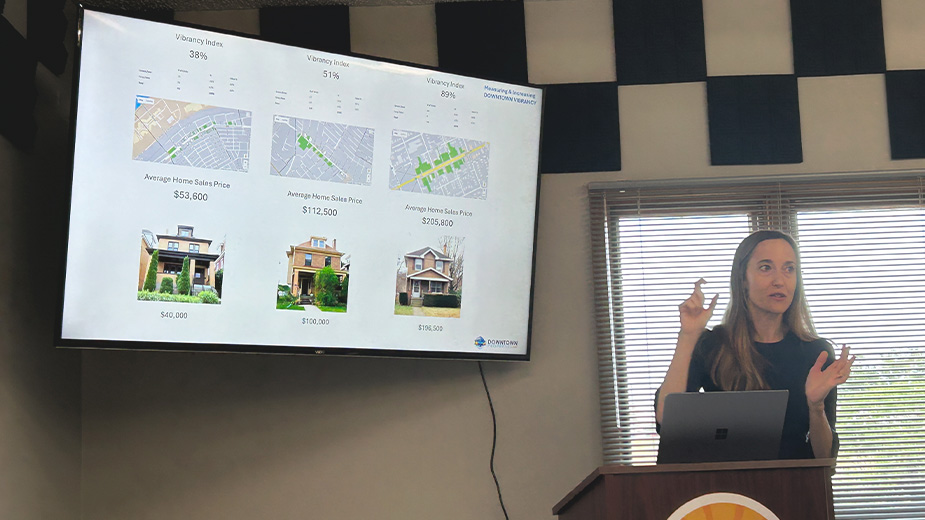Economic Agencies Prepare for Post-COVID World
YOUNGSTOWN, Ohio — Regional economic development leaders remain on the job and are getting some inquiries during the coronavirus outbreak.
Even so, they acknowledge deal flow has slowed and they now have to operate with a greater reliance on technologies that permits them to work at a distance. And, they are making plans for how they will operate in the post-pandemic world.
“The work is still going on – just a different approach to it,” says Tom Humphries, president and CEO of the Youngstown/Warren Regional Chamber.
The Regional Chamber has transitioned its traditional retention visits of knocking on doors to making phone calls. It is still receiving inquiries about new development – at least 10 new projects have been brought to the chamber’s attention since the outbreak. That tells Humphries that while the coronavirus remains a problem, businesses aren’t stopping work because of it.
“We’re still doing a lot of work for those companies that are exploring opportunities in our market,” he says. Much of that work is behind the scenes – researching properties and trying to match their needs with incentive programs that might be available.
One program available to help small businesses is Emerge, which the chamber launched in early April. “It is designed to assist small businesses today with the various challenges that they have,” Humphries says.
Emerge is set up to direct businesses to resources such as financing and government grant programs. Its website is laid out so those technologically challenged can navigate it with little difficulty, he says.
Digital communications play a large role now in how the chamber stays in touch with its membership. In addition to making sure the website is user-friendly, the chamber issues newsletters and shares other information electronically.
“We see that as our primary means to be able to communicate right now,” Humphries says.
Penn-Northwest Development Corp. is helping small businesses by connecting them to the various emergency funds available, says its president and CEO, Randy Seitz. “We’re getting calls for everything from tanning salons to companies as big as Hodge Foundry,” he reports.
Rather than rely on digital channels, Penn-Northwest is using the telephone to conduct business, Seitz says. “For example, we had our board meeting the first Thursday of this month and it was by telephone. We’re not using Skype. We’re not using any video conferencing,” he says.
During the first week of Pennsylvania’s shutdown, Penn-Northwest’s focus was on providing information to local businesses regarding whether they were qualified to remain open as an essential business and whether they could seek a waiver if not, Seitz says.
After that, the agency worked with small businesses trying to secure funds from the emergency loan program Pennsylvania created and, subsequently, the federal Paycheck Protection Program loan fund.
Pennsylvania made just $61 million available in its loan program, he reports, and applications closed after five days.
“We had probably two dozen Mercer County businesses that would have liked to apply for those emergency funds. But by the time they gathered the information that the state required to approve their application, the program closed,” Seitz says.
Because most of the approved applications were in the Philadelphia area, Penn-Northwest is putting together ideas for local legislators to recommend that should there be a second round of funding, that the money be distributed evenly among Pennsylvania’s 67 counties rather than awarded first-come, first-served.
In Columbiana County, while the outbreak is a public health issue, it is also taking a big economic toll. “Obviously these are extremely uncertain times,” says Penny Traina, executive director of the Columbiana County Port Authority.
CCPA’s staff of three began to work remotely when Gov. Mike DeWine issued his initial stay-at-home order. Traina is the only one who still goes into the office to monitor calls and be available to provide help to businesses. She and her staff hold conference calls remotely three times each week and she participates in several webinars and conference calls daily. Digital has become the chief means of reaching out to members.
During March, the port authority was able to meet application deadlines for eight grant requests, and was working on two more in April, Traina reports.
Her office is receiving a few calls regarding expansion projects or other economic development activity. The businesses along the Ohio River – companies that move steel coil, barite and other minerals – that have responded to Traina’s inquiries all report their volumes are steady, she says.
During the pandemic, CCPA is working with its partner agencies in the county – including the county development department and the Sustainable Opportunity Development Center Inc. in Salem – to provide assistance to businesses, Traina says.
Tad Herold, Columbiana County development director, has assembled a clearinghouse website with federal and state programs available to businesses, she notes.
Traina has an open-door policy for any companies that need assistance such as filling out applications for programs.
She has also reached out to the county health department, emergency management agency and local hospitals to offer the port authority’s help to locate personal protective equipment and supplies, she says.
“We’ve been trying to do some things to prepare for coming out of this,” Penn-Northwest’s Seitz says.
Those efforts include contacting banks in the region to see if they’re interested in partnering with his organization and other agencies to establish a fund for “local businesses that need just that extra boost while coming out of this pandemic,” he says.
Penn-Northwest is also preparing its plan of work for the upcoming year, which begins in July.
The organization will focus 80% of its efforts on local businesses and 20% on recruiting new industries. Every afternoon, the Penn-Northwest staff confers on the phone to do strategic planning to build the new program of work and address how to support companies.
“We want to make sure that companies that are coming out of this epidemic have the tools and the resources available to continue to operate and keep their doors open in Mercer County,” Seitz says.
Also being discussed is the creation of a “disaster recovery plan” should something like this happen again. In that event, Penn-Northwest would be “able to quickly mobilize and have the resources available for local businesses and their employees, and keep them employed while such a disaster is going on,” he says.
While Emerge is designed to help small businesses navigate their current challenges, the Regional Chamber is considering what the landscape will look like in the next several weeks, Humphries says. The chamber is also evaluating how it operates internally, including using video.
There will still be face-to-face meetings, but there will be an “enhanced approach” to contact with customers, he says.
“There’s more technology being adopted as a necessity and I think we’ll continue to use it. We always wanted to make more contact with our customers and right now we’re doing more contact because we’re not driving from one place to the next,” Humphries says. “We’re actually picking up the phone and we’re talking to a lot more people, so I think our communications with members has improved because there’s no way I could have driven to 20, 25 locations in one day. But I can talk to 25 customers on the phone.”
CCPA also is preparing for what lies ahead. It is collecting data to prepare a long-term contingency plan “so that we can be better prepared for the future,” Traina says.
“The port authority will also draft a policy that will incorporate stay-at-home guidelines to follow should a similar crisis occur. This is all new to us,” Traina says.
Copyright 2024 The Business Journal, Youngstown, Ohio.



